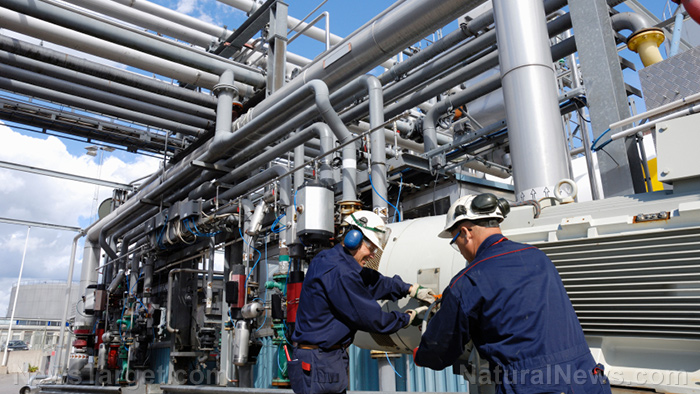German prosecutors launch probe into possible SABOTAGE of LNG pipeline
01/11/2024 / By Richard Brown

German federal prosecutors have launched an investigation into a suspected case of sabotage after discovering small holes in a liquefied natural gas (LNG) pipeline being constructed in northern Germany.
The inquiry, now under the jurisdiction of the Federal Public Prosecutor General, is exploring the possibility of anti-constitutional sabotage.
The act of drilling multiple holes through the pipeline’s robust construction suggests a considerable level of determination, with the typical thickness of such pipelines’ walls exceeding an inch. The process of drilling such holes with standard hand tools would likely take at least 20 minutes each, involving noisy operations.
While a lone-wolf scenario isn’t ruled out, the complexity of the act hints at the potential involvement of multiple individuals.
Several potential suspects are being considered. Notably, Last Generation Climate Extremists, known for high-profile sabotage attacks, have targeted private jets and yachts, and engaged in activist vandalism; however, their usual pattern involves seeking publicity.
Russia is another potential suspect, as the new pipeline aims to reduce dependency on Russian gas, potentially diminishing Moscow’s leverage over Germany. (Related: After shutting down its last three nuclear power plants, Germany now has to buy nuclear-generated electricity from France.)
Even Ukraine, accused previously of attacking the Nord Stream undersea pipeline, could be motivated to influence Russia’s gas route to Europe.
The incident prompts questions about Germany’s energy security and potential countermeasures against an ongoing sabotage campaign. Despite Germany’s recent deal with Norway to replace Russian gas imports, the persistence of sabotage efforts raises concerns about the effectiveness of this new agreement.
Some suggest a reconsideration of coal, which, while susceptible to sabotage, may offer easier defense compared to a lengthy gas pipeline. Nuclear plants, known for their defensibility with robust containment domes, present an alternative, though some components may prove challenging to harden against determined attacks.
The vulnerability of electrical distribution networks is evident, as demonstrated in South Africa, where metal thieves strategically targeted power pylons.
Surprisingly, Germany’s solar and wind facilities have not faced attacks, potentially signaling a reluctance to target energy systems already prone to failures. The evolving situation necessitates Germany’s reassessment of energy security strategies and consideration of alternative sources in response to the persistent threat of sabotage.
Repairs nearly complete
While German federal prosecutors investigate potential sabotage, Dutch energy company Gasunie reported that it is on the verge of completing repairs on the LNG pipeline.
The 55-kilometer pipeline is crucial for linking Germany’s Brunsbuttel LNG regasification terminal to the northern gas grid. This infrastructure aims to replace Russian gas supplies lost since the invasion of Ukraine in 2022 and damage to the Nord Stream pipeline in the Baltic Sea.
The company stated that most defects have been repaired, with remaining work underway, and assured the security of energy supplies for northern Germany this winter despite the pipeline’s delayed start-up.
The Hoegh Gannet floating storage and regasification (FSRU) unit at Brunsbuttel, along with another FSRU scheduled to come online this year, will add a combined 7.5 billion cubic meters of regasification capacity for Germany.
The European Commission approved a €40 million ($43.9 million) state aid package in July 2023 to support the construction of an onshore LNG terminal at Brunsbuttel, expected to replace current FSRU-based facilities and start operations in 2026.
Gasunie, alongside German utility RWE, is driving the project with a 40 percent stake, while the German government holds 50 percent through investment and development bank KfW.
The terminal is positioned to enhance energy security and reduce dependency on Russian gas. The Federal Public Prosecutor’s Office is overseeing the investigation into suspected sabotage, with the pipeline’s start-up now expected in February 2024 instead of December 2023.
Gasunie highlighted the continued secure feed-in of maximum LNG volumes from the floating terminal at Brunsbuttel through an existing gas pipeline, unaffected by the new pipeline’s delay.
Watch this video that talks about the pipeline wars.
This video is from the InfoWars channel on Brighteon.com.
More related stories:
Germany blocks Hungary’s nuclear reactor project, putting Budapest’s energy sovereignty under threat.
Germany falls into RECESSION amid high energy prices and drop in consumer spending.
Sources include:
Submit a correction >>
Tagged Under:
big government, Collapse, conspiracy, energy security, energy supply, fuel rationing, fuel supply, gas, Germany, insanity, LNG, national security, pipeline, power, power grid, Russia, sabotage
This article may contain statements that reflect the opinion of the author
RECENT NEWS & ARTICLES
COPYRIGHT © 2017 REAL INVESTIGATIONS NEWS




















